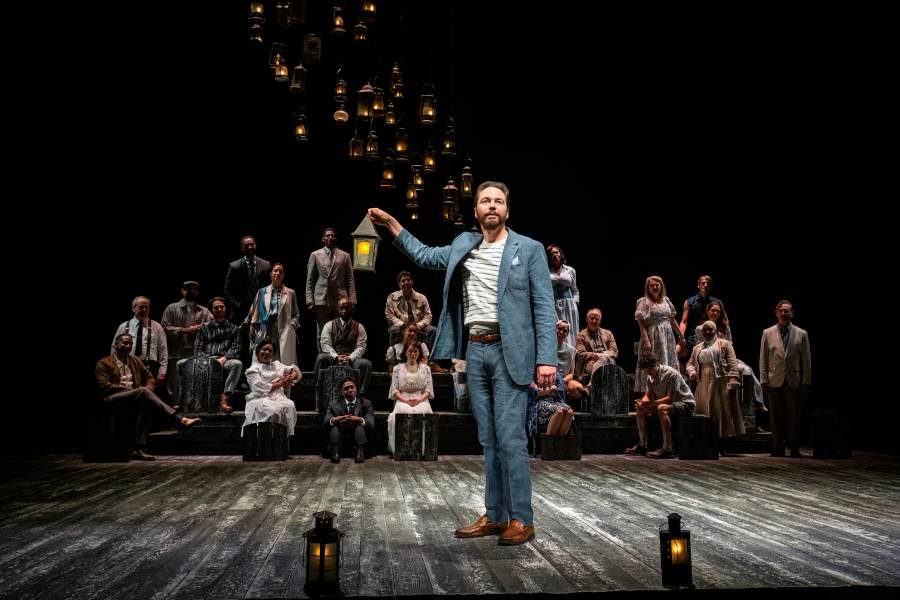

We grow up, seek partners and then we die. That’s the storyline of “Thornton Wilder’s Our Town”. There’s very little cutesy and kitschy about the play which begins in 1901 in Grover’s Corners, New Hampshire. So why has it become a classic? These are our lives on stage and although specific names and places may change, we all follow the same path.
What makes the play unusual is that it is about ordinary everyday life, with ordinary everyday people. There’s no flying car, crashing chandelier, special effects or costumed animals, yet the play has endured and been produced for years. This revival of the play, expertly directed by Kenny Leon, begins with the entire cast seated onstage, some scrolling through their phones. Then there’s an interfaith ‘mash-up’ of Jewish, Muslim and Christian prayer. “Braided Prayer” by Abraham Jam connects with everyone in the audience.
The Stage Manager, played by Jim Parsons, introduces the play as a play, naming the producer Jeffrey Richards and director Leon and pointing to several of the cast members, reminding us that this is a play. He describes the setting of the play- “Grover’s Corners, New Hampshire – just across the Massachusetts line” and mentions several of the people who live there. He gives background on characters, even providing dates that they died. Parsons is an interesting choice as Stage Manager since the role is usually played by an older actor. But he does well, especially with his dry delivery and expressive face.
The story centers on two neighboring families, the Gibbs and the Webbs. Dr. Gibbs (Billy Eugene Jones) and his wife, Mrs. Gibbs (Michelle Wilson) and their two children live near Mr. Webb, Grover’s newspaper publisher (Richard Thomas), his wife, Mrs. Webb (Katie Holmes) and their children. Later their children, George Gibbs and Emily Webb, will marry.
Although the show was written in 1938 and set at the beginning of the twentieth century, it feels relevant and modern. The Gibbs family is played by black actors while the Webb family is white. but color is never mentioned. John McGinty, the milkman (Howie Newsome) is deaf and signs as he delivers milks, cream and weather reports.The large cast is a mix of television and stage performers. TV stars like Zoey Deutch ( Emily Webb) and Holmes ( Mrs.Webb) work with skilled stage performers like Thomas and Ephraim Sykes (George Gibbs). However, the acting is uneven. Holmes and Jones are lightweight while Sykes Thomas and Wilson have natural stage presence.
The smells of Mrs Gibbs’s heliotropes and the breakfast bacon waft through the Ethel Barrymore Theatre create a rustic charm and make the audience feel involved.
Wilder’s play deals with life honestly in a clear matter-of-fact manner. There’s no softening or romanticizing, not even during George and Emily’s wedding when Mrs. Gibbs says, “Weddings are perfectly awful things-farces.”
The three act play runs without an intermission, with just an announcement by the Stage Manager as the play moves forward. The first act is at the turn of the century, the second in 1904, and the final one is set in 1913. When Emily dies in childbirth in Act 3, she asks to go back to her life for just one day. Arriving on her 12th birthday, she notes with pain how no one is stopping to appreciate the day; no one appreciates life. The final act focuses on what we miss when we aren’t truly present.
I’ve seen the play produced a few times and I’m always surprised by how affecting it is and how relevant it feels. This version was no different. Times have changed, in some cases dramatically with the advent of technology and the world is getting smaller but some things are immutable. “Was Wilder reminding us to slow down and smell the coffee? Thornton Wilder’s Our Town” reminds the audience of the fragility of life and the importance of love.
Barrymore Theatre
243 West 47th
New York, NY